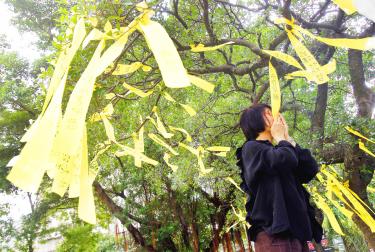Taiwanese human rights advocates yesterday called on US President Donald Trump to use his visit to Beijing this week to ask for the release of detained democracy advocate Lee Ming-che (李明哲).
Trump should raise Lee’s case when meeting Chinese President Xi Jinping (習近平) following his arrival in Beijing today, the advocates said.
“We think US government departments and especially the president at the top should express their concern,” said Eeling Chiu (邱伊翎), a representative from an alliance of more than 10 Taiwanese rights groups that organized a campaign pressing for Lee’s release that began yesterday. “The president should express his views.”
In June the US Congressional Executive Commission on China added Lee to a database of people it considers political prisoners.
“We of course hope from a human rights point of view that the United States, as one of the world’s most important rights defenders, will pay attention not just to the Lee Ming-che case, but possibly bring up others” in meetings with Xi, Covenants Watch chief executive officer Huang Yi-bee (黃怡碧) said.
Trump’s talks with Xi are expected to center on trade disputes and reining in North Korea’s nuclear weapons program and it is unclear whether he plans to raise human rights concerns.
The writers’ organization PEN America has urged him to ask China to free the widow of Nobel Peace Prize winner Liu Xiaobo (劉曉波), Liu Xia (劉霞), from house arrest.
That followed a letter signed by literary luminaries such as Margaret Atwood and Philip Roth calling on China to remove restrictions on Liu Xia’s freedom of movement and allow her to meet freely with whomever she wishes.
At yesterday’s inaugural event, organizers stood under a tree festooned with ribbons to chant “Lee Ming-che is innocent” and “Free Lee Ming-che.”
“No matter what laws China uses, the Lee Ming-che case needs to be closed as soon as possible,” Judicial Reform Foundation director Kao Jung-chih (高榮志) said.
“We think Lee Ming-che is a political prisoner,” Kao said. “What he did is something we all do in our daily lives, whether it’s Taiwan society or Chinese society, which is to express our own ideas and views.”
Source: Taipei Times - 2017/11/08





















